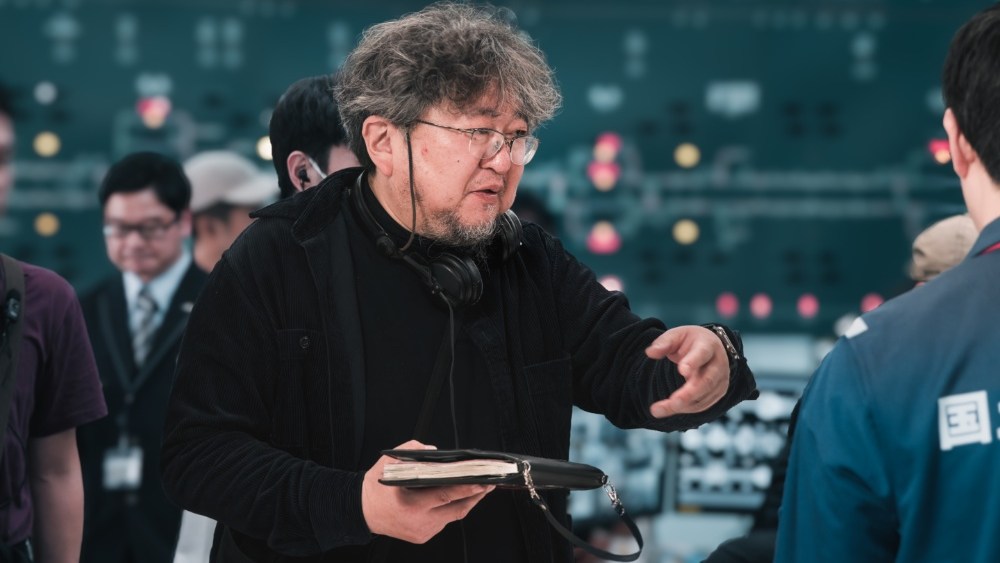Japanese filmmaker Shinji Higuchi finds beauty in bullet trains specifically so he can destroy them on screen, a creative paradox that defines his latest film, Netflix‘s “Bullet Train Explosion,” and much of his celebrated career.
“The order, the precision that it symbolizes and something that’s stable… That’s something that I’m drawn to, and because I love it so much, I want to destroy it,” Higuchi tells Variety about the Japan-set film at Netflix’s APAC showcase in Tokyo.
The film’s central premise is that bombs are rigged to detonate instantly if the titular train’s speed drops below 100 km/h. The bomber demands JPY100 billion ($660 million) as ransom to disarm the explosive device, triggering a desperate race against time for crew, passengers and railway personnel.
Prior to “Bullet Train Explosion,” Higuchi established himself as a master of tokusatsu (Japanese practical special effects, often using miniatures) filmmaking, with trains frequently appearing in his destructive setpieces. His co-directed “Shin Godzilla” (2016) featured the demolition of a Keikyu 800 series train, while his earlier work “Doomsday: The Sinking of Japan” (2006) showcased the dramatic destruction of a Fujikyuko 5000 series train. His expertise in special effects dates back to his breakthrough work on “Gamera: Guardian of the Universe” (1995), establishing career-long fascination with spectacular visual presentations of disaster.
“Bullet Train Explosion” marks Higuchi’s modern reimagining of a classic Japanese crime film from 1975, one that left an indelible impression on him as a young boy. “It was the first non-kids film I saw,” Higuchi recalls about the original “Bullet Train,” which he first watched at age 10 after skipping school. “There was a criminal who committed a crime and was going to pay back with their life. That was the story.”
That childhood viewing experience proved formative for Higuchi, who admits feeling a personal connection to the film’s themes of crime and punishment. “Because it was my first time disobeying my parents… I kind of saw myself in there and saw what becomes of someone who committed a crime or did something bad. So that was very impactful, and I never forget that experience,” he explains.
“Bullet Train Explosion”
Netflix
Known for his pioneering work in visual effects and tokusatsu, Higuchi’s creative sensibilities are driven by the thrill of disruption. “I like the thrill of seeing something that’s not supposed to happen, happen to you,” he says. “That really excites me in a weird way — makes me ecstatic.”
Adapting the story for modern audiences presented unique challenges. Higuchi notes that the social climate in Japan has changed drastically in the past 50 years, leading the creative team to reconsider who would be the film’s antagonist in contemporary Japan. They eventually drew inspiration from conversations with younger generations who expressed a sense of hopelessness about the future.
On the technical side, Higuchi discusses his approach to blending practical effects with visual effects, noting that when he began his career, tokusatsu was often ridiculed by filmmakers. “They would make fun of, poke fun at tokusatsu. You know, ‘Those are like for kids, so we don’t want to use that in my precious film,’” he recalls. His goal has been to bridge this divide: “What I want to do is to take the best out of both worlds and put it together.”
For Higuchi, scale remains an essential element of cinema. “I love things that are exaggerated. When I watch large scale things… I think that it’s not worth going to the the cinema if it’s not that big of a scale,” he says, adding that this now extends beyond visuals to include “the emotional journey that the character, the main character, goes through.”
Without any spoilers, “Bullet Train Explosion” explicitly refers to its 1975 predecessor. When asked whether “Bullet Train Explosion” is a homage or reinvention, Higuchi suggests it evolved to become more of the former. “We started off with a different title. The more we created, it became closer and closer to the original,” he explains, noting that they eventually decided to use a similar title. The film includes subtle references Japanese audiences should recognize, such as a judo team among the train passengers — a detail that stood out in the original film.
Higuchi confirms that he has watched most adaptations of bullet train disaster films, including the recent Brad Pitt vehicle, which he describes as looking “fun.” He expresses interest in watching the 1980 Bollywood version titled “The Burning Train,” which he has not yet seen.
However, the filmmaker remains somewhat cryptic about his next project, suggesting it is “very complex” with “a lot going on.”
“Bullet Train Explosion” streams on Netflix from April 23.
Read the full article here








